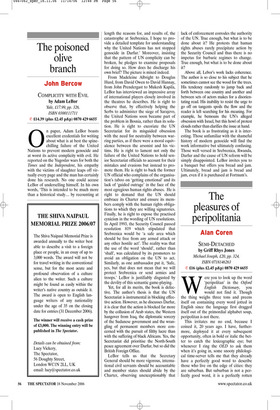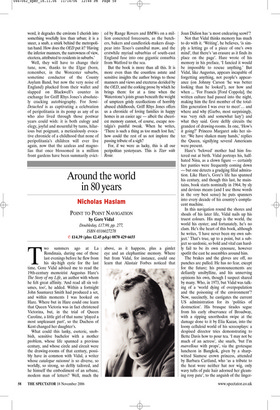The pleasures of peripolitania
Alan Coren
SEMI-DETACHED by Griff Rhys Jones Michael Joseph, £20, pp. 324, ISBN 0718146263 ✆ £16 (plus £2.45 p&p) 0870 429 6655 Were you to look up the word ‘peripolitan’ in the Oxford English Dictionary, you would not find it. Though the thing weighs three tons and preens itself on containing every word jotted in English since the language first dragged itself out of the primordial alphabet soup, peripolitan is not there.
This irritates me no end, because I coined it, 20 years ago. I have, furthermore, deployed it at every subsequent opportunity, often in bold or italic the better to catch the lexicographic eye; but whenever I ring the OED to ask them when it’s going in, some snooty philological time-server tells me that they already have a perfectly good word to describe those who live on the edge of cities: they are suburban. But suburban is not a perfectly good word, it is a perfectly rotten word, it degrades the environs I cherish into something woefully less than urban; it is a sneer, a snub, a smirk behind the metropolitan hand. How does the OED put it? ‘Having the inferior manners, the narrowness of view, etcetera, attributed to residents in suburbs.’ Well, they will have to change their tune, now, thanks to the Elgar (born, remember, in the Worcester suburbs, sometime conductor of the County Asylum Band, but now the very noise of England) plucked from their wallet and slapped on Blackwell’s counter in exchange for Griff Rhys Jones’s absolutely cracking autobiography. For SemiDetached is as captivating a celebration of peripolitania in its pomp as any of us who also lived through those postwar years could wish: it is both eulogy and elegy, joyful and mournful by turns, hilarious but poignant, a meticulously evocative chronicle of a childhood that none of peripolitania’s children will ever live again, now that the azaleas and magnolias that once blossomed in a million front gardens have been summarily evict ed by Range Rovers and BMWs on a million concreted forecourts, as the butchers, bakers and candlestick-makers disappear into Tesco’s cannibal maw, and the erstwhile myriad suburbias of south-east England fuse into one gigantic conurbia from Watford to the sea.
But the book is more than all this. It is more even than the countless astute and sensitive insights the author brings to those manners and views and etceteras derided by the OED, and the corking prose by which he brings them: for at a time when the Waterstone’s joists groan beneath the weight of umpteen grisly recollections of horribly abused childhoods, Griff Rhys Jones offers us a chronicle of loving families in happy homes in an easier age — albeit the cheeriest memory cannot, of course, escape nostalgia’s painful tweak. When he writes, ‘There is such a thing as too much lost fun,’ how could the rest of us not implore the passing tribute of a sigh?
For, if we were as lucky, this is all our peripolitan yesteryears. This is Tizer with Rosie.



































































































 Previous page
Previous page